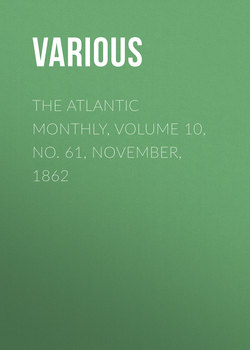Читать книгу The Atlantic Monthly, Volume 10, No. 61, November, 1862 - Various - Страница 13
WILD APPLES
LIFE IN THE OPEN AIR
CHAPTER IX
ОглавлениеCHESUNCOOK
Chesuncook is a "bulge" of the Penobscot: so much for its topography. It is deep in the woods, except that some miles from its opening there is a lumbering-station, with house and barns. In the wilderness, man makes for man by a necessity of human instinct. We made for the log-houses. We found there an ex-barkeeper of a certain well-known New-York cockney coffee-house, promoted into a frontiersman, but mindful still of flesh-pots. Poor fellow, he was still prouder that he had once tossed the foaming cocktail than that he could now fell the forest-monarch. Mixed drinks were dearer to him than pure air. When we entered the long, low log-cabin, he was boiling doughnuts, as was to be expected. In certain regions of America every cook who is not baking pork and beans is boiling doughnuts, just as in certain other gastronomic quarters frijoles alternate with tortillas.
Doughnuts, like peaches, must be eaten with the dew upon them. Caught as they come bobbing up in the bubbling pot, I will not say that they are despicable. Woodsmen and canoemen, competent to pork and beans, can master also the alternative. The ex-barkeeper was generous with these brown and glistening langrage-shot, and aimed volley after volley at our mouths. Nor was he content with giving us our personal fill; into every crevice of our firkin he packed a pellet of future indigestion. Besides this result of foraging, we took the hint from a visible cow that milk might be had. Of this also the ex-barkeeper served us out galore, sighing that it was not the punch of his metropolitan days. We put our milk in our tea-pot, and thus, with all the ravages of the past made good, we launched again upon Chesuncook.
Chesuncook, according to its quality of lake, had no aid to give us with current. Paddling all a hot August mid-day over slothful water would be tame, day-laborer's work. But there was a breeze. Good! Come, kind Zephyr, fill our red blanket-sail! Cancut's blanket in the bow became a substitute for Cancut's paddle in the stern. We swept along before the wind, unsteadily, over Lake Chesuncook, at sea in a bowl,—"rolled to starboard, rolled to larboard," in our keelless craft. Zephyr only followed us, mild as he was strong, and strong as he was mild. Had he been puffy, it would have been all over with us. But the breeze only sang about our way, and shook the water out of sunny calm. Katahdin to the North, a fair blue pyramid, lifted higher and stooped forward more imminent, yet still so many leagues away that his features were undefined, and the gray of his scalp undistinguishable from the green of his beard of forest. Every mile, however, as we slid drowsily over the hot lake, proved more and more that we were not befooled,—Iglesias by memory, and I by anticipation. Katahdin lost nothing by approach, as some of the grandees do: as it grew bigger, it grew better.
Twenty miles, or so, of Chesuncook, of sun-cooked Chesuncook, we traversed by the aid of our blanket-sail, pleasantly wafted by the unboisterous breeze. Undrowned, unducked, as safe from the perils of the broad lake as we had come out of the defiles of the rapids, we landed at the carry below the dam at the lake's outlet.
The skin of many a slaughtered varmint was nailed on its shingle, and the landing-place was carpeted with the fur. Doughnuts, ex-barkeepers, and civilization at one end of the lake, and here were muskrat-skins, trappers, and the primeval. Two hunters of moose, in default of their fern-horned, blubber-lipped game, had condescended to muskrat, and were making the lower end of Chesuncook fragrant with muskiness.
It is surprising how hospitable and comrade a creature is man. The trappers of muskrats were charmingly brotherly. They guided us across the carry; they would not hear of our being porters. "Pluck the superabundant huckleberry," said they, "while we, suspending your firkin and your traps upon the setting-pole, tote them, as the spies of Joshua toted the grape-clusters of the Promised Land."
Cancut, for his share, carried the canoe. He wore it upon his head and shoulders. Tough work he found it, toiling through the underwood, and poking his way like an elongated and mobile mushroom through the thick shrubbery. Ever and anon, as Iglesias and I paused, we would be aware of the canoe thrusting itself above our heads in the covert, and a voice would come from an unseen head under its shell,—"It's soul-breaking, carrying is!"
The portage was short. We emerged from the birchen grove upon the river, below a brilliant cascading rapid. The water came flashing gloriously forward, a far other element than the tame, flat stuff we had drifted slowly over all the dullish hours. Water on the go is nobler than water on the stand; recklessness may be as fatal as stagnation, but it is more heroic.
Presently, over the edge, where the foam and spray were springing up into sunshine, our canoe suddenly appeared, and had hardly appeared, when, as if by one leap, it had passed the rapid, and was gliding in the stiller current at our feet. One of the muskrateers had relieved Cancut of his head-piece, and shot the lower rush of water. We again embarked, and, guided by the trappers in their own canoe, paddled out upon Lake Pepogenus.
